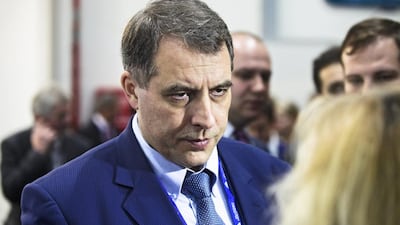A high-level Russian energy ministry delegation will meet UAE officials tomorrow to push for deals with the UAE, including oil concessions for Rosneft, and gas supply deals from Gazprom, the country’s two leading energy companies.
Russia’s deputy energy minister, Yury Sentyurin, said he and other top Russian energy officials will meet counterparts at the Ministry of Energy tomorrow.
Speaking on the sidelines of the PowerGen Middle East conference, which he opened yesterday with the keynote speech, Mr Sentyurin said he saw good prospects for regional gas supply deals: “Gazprom has opportunities to supply [liquefied natural gas] into the UAE because of the shortage of natural gas in this country. Gazprom, [through its international marketing division] has put forward such kind of proposals for every country in this region … and we’ve got some opportunities.”
Mr Sentyurin also said Russia is pushing for oil deals in the UAE. “Rosneft is in the process of talks with its partners here. No results yet, but they have signed a memorandum of understanding in St Petersburg for further cooperation and Rosneft is going to open a representative office here”.
Rosneft is among the dozen or so companies bidding for production agreements to replace the old oil extraction agreements that were in place since 1939 and which expired last January. The Supreme Petroleum Council of Abu Dhabi has yet to decide on which companies will operate the new concessions which previously were dominated by Exxon, Shell, BP and Total.
The onshore oilfields, which are the main object of interest for Rosneft, account for a little more than half of the UAE’s total crude production of 2.8 million barrels per day.
Other companies bidding for oil concessions include Korea National Oil, Japan Oil Development, China National Petroleum, Statoil, Occidental and Eni.
Russia is making a heavy marketing push at this year’s PowerGen exhibition, with day one designated “Russia Day” by the conference organiser PennWell, as Russia competed with other heavy hitters in the power sector, including GE and Rolls-Royce, for fast-growing regional business.
Russia has been making a strategic push into the Middle East and Asia, with energy at the forefront, particularly since it faces sanctions from the US and European Union over its confrontation and land dispute with Ukraine. Europe is Russia’s most important trading partner, accounting for the bulk of its energy sales – particularly natural gas – and it is the source of most of its imports.
But the Middle East and Asia represent big market opportunities for Russia as the world’s fastest growing regions, and even faster-growing energy consumers. In the UAE, for example, GDP growth has been running at 4.8 per cent but domestic energy demand is growing at above 9 per cent. Most power generation in the UAE is currently from natural gas.
Last month, Russia announced the completion of a pipeline deal with China that had been long under negotiation whereby it will supply massive amounts of gas for China's rapid growth and switch from coal to natural gas. That pits Russia as a competitor with some of the Middle East's big natural gas suppliers – particularly Qatar but also the UAE and others who are ramping up LNG capabilities.
However, Mr Sentyurin said he expected that the pace of economic growth in both Asia and the Middle East would temper that competition. “It is a competition, of course, but we are not afraid of such competition,” he said. “Asia- Pacific region has most rapid dynamics of development and will go on for decades. We think demand for energy sources, including LNG, and [pipeline] natural gas will increase. We think it wouldn’t be severe competition.”
The other main area of energy trade between Russia and the UAE is in nuclear energy, with the UAE set to start the first of its four reactors in 2017. It already has in place a deal with a unit of Rosatom, Russia’s nuclear company, which will supply about half of the required enriched uranium commencing just before commissioning of the first reactor, according to Umarpasha Khanaliev, Rosatom’s director of strategic initiatives.
The two countries have a growing trade relationship, with total volume of trade in 2012 at US$1.5 billion, and non-oil trade soaring by 7.5 per cent in 2013 to $897 million. Earlier this year, the Abu Dhabi Government signed a letter of intent to invest $5bn in Russian infrastructure projects. Meanwhile, Mubadala Fund and the Russian Direct Investment Fund established a joint venture investment vehicle for $2bn.
amcauley@thenational.ae
Follow The National's Business section on Twitter

